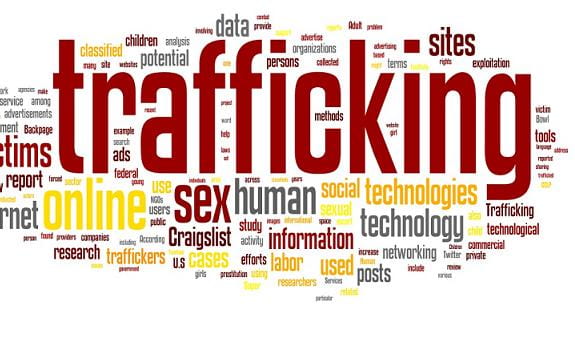In previous posts I have focused on the role of private sector and more specifically high-tech corporations such as Palantir and Microsoft in the fight against sex trafficking. In this blog post I’m switching gears to Academia and writing about academic research which has centered on the using Information and Communication Technology (ICTs) in the fight against sex trafficking. Several new studies have provided readers with a quite comprehensive understanding of the roles of different actors in this battle. As an alumna of the University of Southern California I’m glad to see my fellow USC Trojans in the Annenberg School for Communication and Journalism took the lead in researching modern slavery. Here is a brief introduction of the report they published in 2011 on the role of social networking sites and online classifieds in human trafficking:
The report acknowledge the role of Internet and online-ads as one of the main contributor in boosting sex trafficking and cite its claim from the Shared Hope International report , a study on sex trafficking in Jamaica, Japan, the Netherlands, and the United States:
“Technology has become the single greatest facilitator of the commercial sex trade in all of the countries observed, with the exception of Jamaica, where word of mouth continues to dominate.”
In fact it suggests that private sector firms are among the most capable actors to take action and develop anti-trafficking initiatives because their own services are being exploited by traffickers. Fight fire with fire! According to the report the focused areas can be categorized in automated data collection, natural language processing, facial recognition, and mapping. However, what I found interesting about this report is not solely the tech-only solutions. At USC, Mark Latenoro and his colleagues note that human trafficking is an issue that requires active cross-sector partnership between different stakeholders including: government, the private sector, NGOs, service providers, and academ ia. As a current graduate student in human rights major and also a former electrical engineer who has had a firsthand experience in working at a high-tech corporation, I see this report as very promising and heartwarming in making bridge between Academia and the private sector.
ia. As a current graduate student in human rights major and also a former electrical engineer who has had a firsthand experience in working at a high-tech corporation, I see this report as very promising and heartwarming in making bridge between Academia and the private sector.
Academia can play a major role in analyzing the effectiveness of technology that is offered to law enforcers and NGOs to end human trafficking. They have the ability to address and evaluate different methodologies and answer government, law enforcement, the private sector, and NGOs research questions . Specifically the disciplines such as law, social work, psychology, sociology, anthropology, and human rights that have a history of studying human trafficking and slavery issues. Their involvement help to circumvent the problems that some private companies are negatively criticized for such as: overgeneralization, gender and race blindness and closing their eyes to voluntary sex workers.
The report ends with a call for cooperation among actors across government, nongovernmental, and private sectors to share information and communicating in an effective manner to assure that the tools are user-centric and beneficial to the victims and survivors. In my next posts I will examine the role of government and law enforcers in this fight.
Hey Roya, this was an interesting post and it’s good to see that academics delving deeper into the problem to find the important actors and develop real solutions. Regarding tech corporations and actors in the private sector that happen to facilitate trafficking, have you noticed any overall patterns in how they deal with these issues? Do they change their policies to make it harder for such actions to take place, or alternatively, do they create initiatives to fight back? Hopefully it’s one of these two and they don’t remain indifferent!
One of the benefits of academic research is the supposed neutrality of the work, where researchers are held to strict conflict of interest standards and must disclose who funds the research. Additionally, full professors generally enjoy a high level of academic freedom in the topics they choose to investigate, related to their department. Thus the work of academia serves as an invaluable input into policy making, as well as the other sectors, in helping to highlight areas of investment and further research. You mentioned the specific disciplines of “law, social work, psychology, sociology, anthropology, and human rights” that have historically studies human trafficking — hopefully there are opportunities/incentives to collaborate across disciplines and connect to emerging ones.